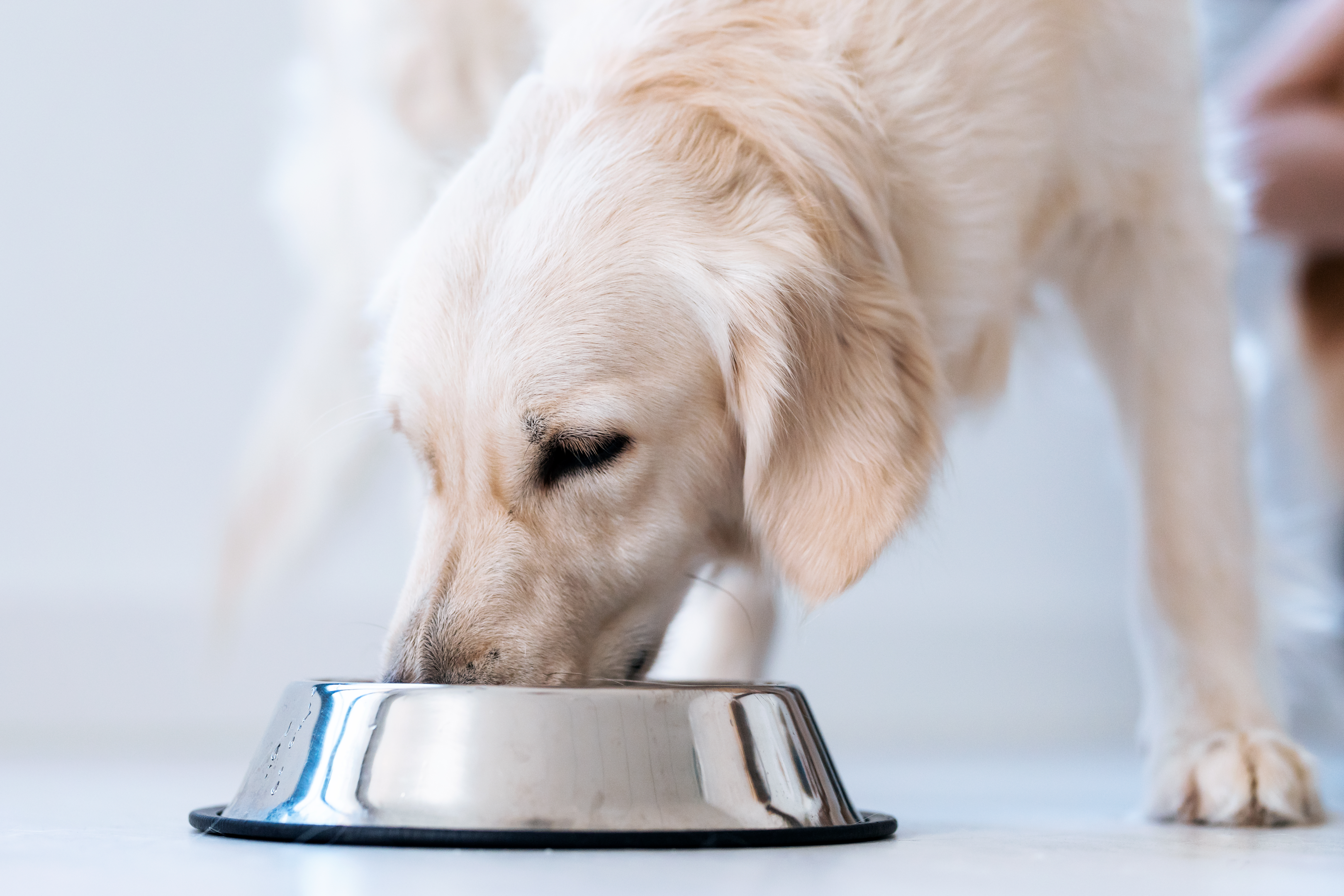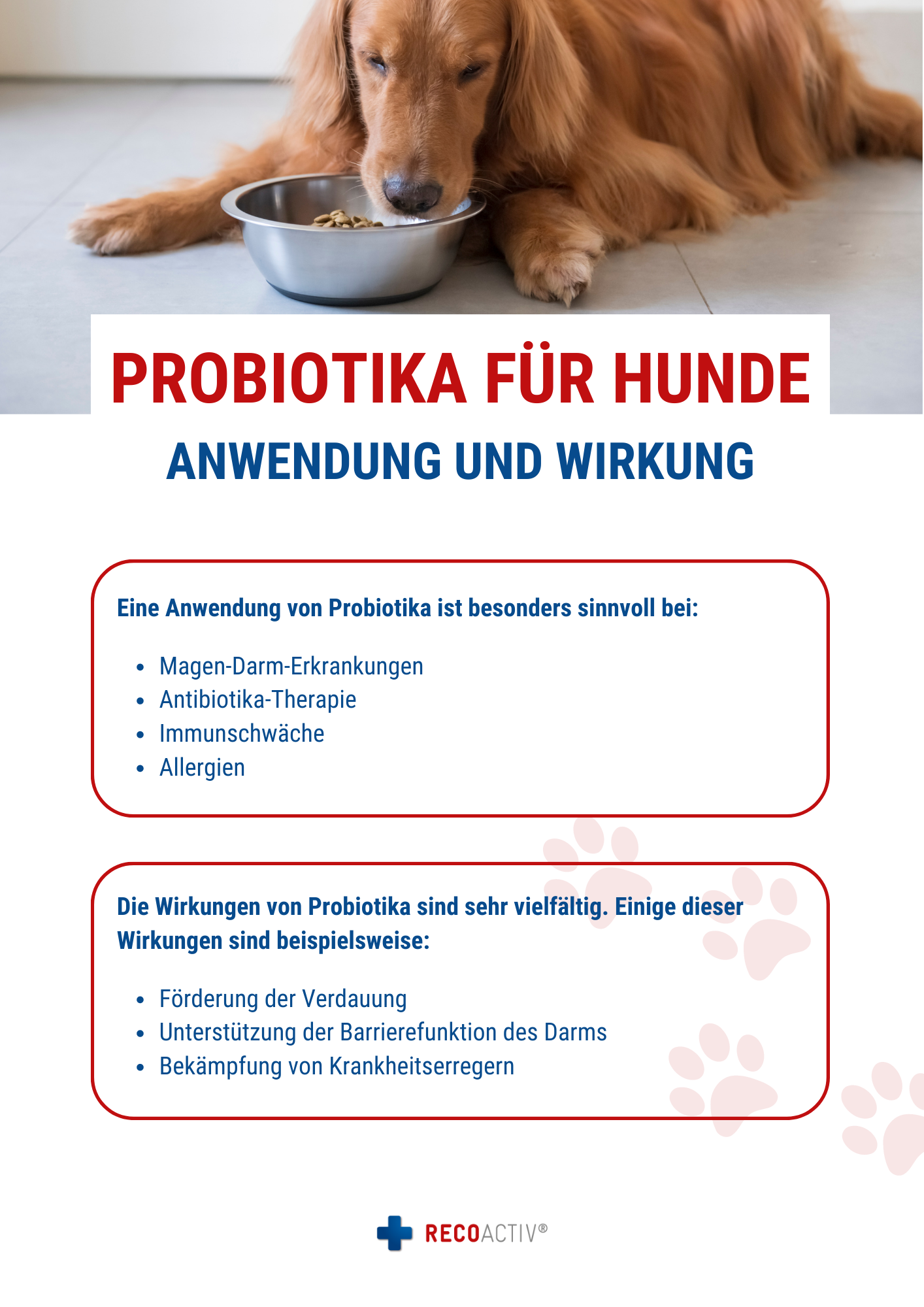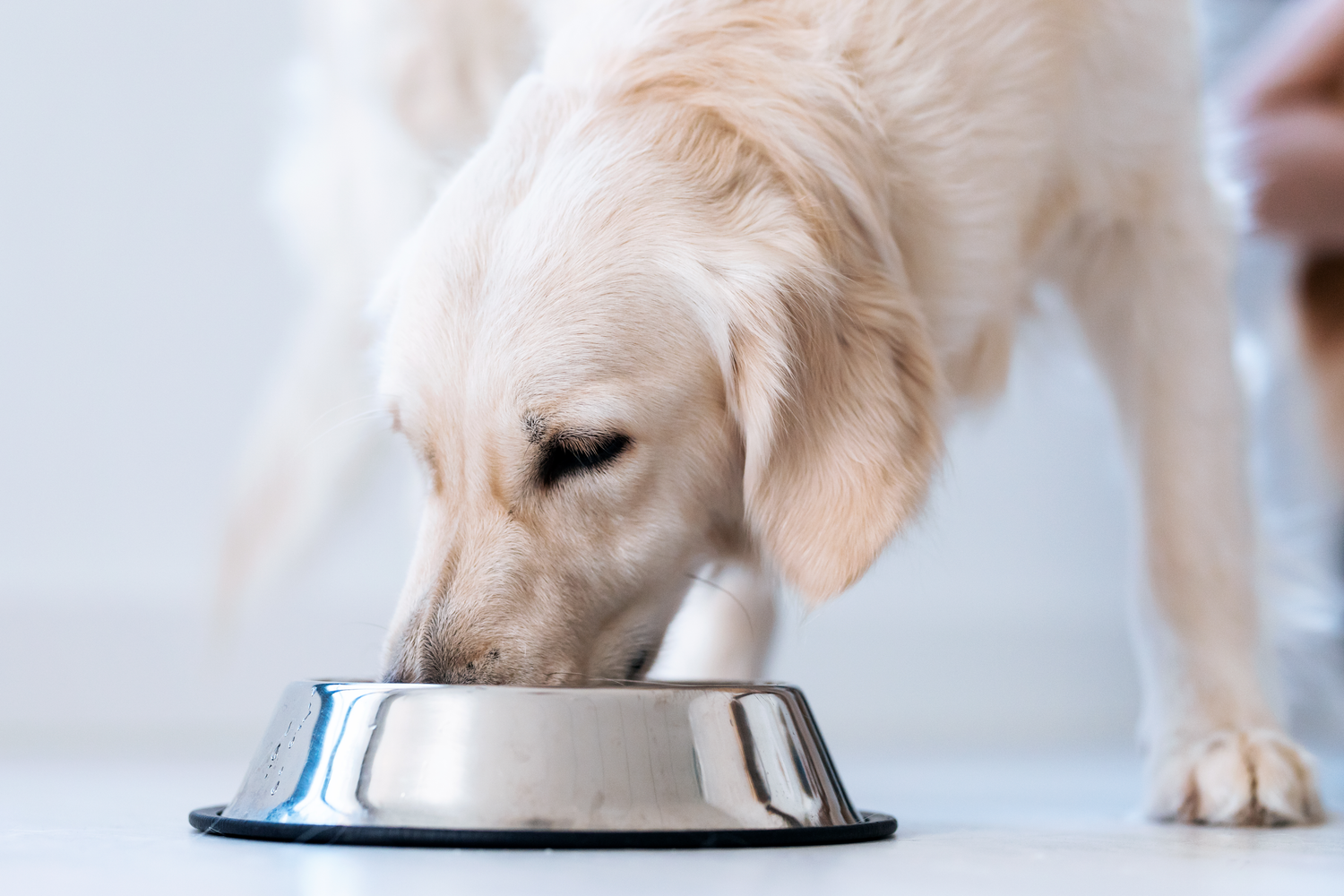Recognizing deficiencies in dogs
Whether a dog needs nutritional supplements or not cannot be answered definitively. It depends on whether the dog is experiencing health problems due to deficiencies. A healthy dog food should already contain all the essential nutrients a dog needs. However, there are many cases where dogs have altered nutritional requirements, for example, due to pregnancy, illness, or age.
This article explains when feeding supplements is beneficial and which ingredients to pay particular attention to. We also discuss how deficiencies manifest in dogs and what to do in such cases.

Recognizing deficiencies in dogs
To determine if a dog needs supplements, it's important to observe it closely. Deficiencies can manifest through various symptoms, including:
- itchy, flaky skin
- Movement restrictions
- increased susceptibility to illness
- Dull and brittle fur, even leading to hair loss.
- Development delays
- premature signs of aging
- Susceptibility to stress
- persistent fatigue, apathy
If you notice one or more of these signs in your dog, you should always take it to the vet first. The vet can perform a thorough examination and prescribe treatment. This could involve medication or nutritional supplements . Supplements can also be used preventively to avoid deficiencies in your dog. However, this is only advisable if there is a well-founded suspicion that your dog needs more nutrients than it can obtain from its regular food.
Caution: An overdose of nutrients could have health consequences . For this reason, you should always consult a veterinarian before indiscriminately feeding your dog any supplementary feed.
Treating nutrient deficiencies : Dogs generally require various basic nutrients , ideally provided through a high-quality complete food . However, nutrient requirements vary from animal to animal. Factors such as age, weight, size, and activity level play an important role. Individual illnesses, pregnancy, or deficiencies also contribute.
This shows that in some cases the administration of high-quality dietary supplements is not only sensible, but also necessary.
What dietary supplements are available for dogs?
Supplements for dogs are designed to strengthen the animal's body and organs, as well as to prevent or alleviate ailments . Common ingredients include vitamins, amino acids, and essential fatty acids . These supplements can be mixed into the dog's food, so the dog will hardly notice them.
As mentioned before, you shouldn't just feed your dog supplements indiscriminately. It's important to seek the opinion of a qualified professional beforehand. At the veterinary clinic, the dog can be examined and its health assessed based on the results.
Here we provide an initial overview of which dietary supplements a dog needs in which situation.
Vitamins
Vitamins are generally divided into two groups: water-soluble and fat-soluble vitamins . While the B vitamins and vitamin C belong to the water-soluble vitamins, vitamins A, K, D, and E require fatty acids to be metabolized by the dog's body.
This distinction is important because an overdose of water-soluble vitamins can be excreted by the body. The situation is different with fat-soluble vitamins. If a dog ingests too high a dose, it can lead to physical damage .
When properly dosed, vitamins play a vital role in a dog's body. They contribute to healthy fur and skin , strengthen the immune system, and ensure a healthy metabolism . Vitamins are also essential for bone development and blood clotting. Therefore, it is crucial to ensure that your dog receives sufficient vitamins through its diet.
Fatty acids
Fatty acids not only provide dogs with energy , but also aid in the absorption of fat-soluble vitamins . They have a positive effect on the immune system and metabolic processes. They are also important for a dog's coat and skin health .
While most fatty acids can be produced by a dog's own body, others must be present in the dog's diet. These include linoleic acid (an omega-6 fatty acid ) and alpha-linolenic acid, an omega-3 fatty acid .
minerals
Minerals, which are micronutrients , cannot be produced by a dog's body. Since dogs need them for a healthy life, they must be present in sufficient quantities in their food or supplemented as a dietary supplement .
Minerals are divided into two subgroups : trace elements and macro elements . Trace elements are only needed by the body in small amounts. These include zinc, iron, and iodine . In contrast, macro elements are required by a dog's body in large quantities. Typical macro elements are calcium, magnesium, and sodium .
While magnesium is responsible for the healthy development of bones and teeth , sodium is responsible for regulating the body's water balance . Iodine, on the other hand, plays a major role in the production of thyroid hormones .
Probiotics
Dogs need microorganisms for healthy gut function . These are contained in so-called probiotics and have a positive effect on the intestines. A healthy gut flora strengthens the immune system , making the dog less susceptible to various diseases. Furthermore, the additional gut bacteria help to displace harmful germs in the digestive tract.
The administration of probiotics is advisable in cases of allergies, diarrhea, or after taking antibiotics.

Strengthening the immune system in dogs
Just like us humans, dogs need a strong immune system so their bodies can defend themselves against various illnesses. For this reason, dog owners should ensure their dog's immune system is adequately strengthened . The best way to do this is through dietary supplements, as these can easily be mixed into their regular food.
Improve skin and coat
Especially during the winter months and when the dog is shedding its coat , it should be supported as much as possible with nutritional supplements. The shedding process can be supported by high-quality protein sources for keratin production, B vitamins, zinc, biotin, and unsaturated fatty acids .
Arthritis in dogs is not something to be taken lightly, but even in this case, a lot can be achieved through nutritional supplements for dogs.
Dietary supplements for joint problems
If a dog suffers from joint problems, dietary supplements can be added to its normal diet to promote a healthy musculoskeletal system . The following effects can be achieved:
- Protection and regeneration of articular cartilage
- Promoting the formation of synovial fluid
- Relief of inflammation
Supplementary feeds for muscle building in dogs also support diseased joints and counteract muscle loss.
Digestive problems in dogs: Clay and probiotics provide relief
A dog can suffer from diarrhea and flatulence when the balance of microorganisms in its body is disrupted. Preparations containing clay are helpful in such cases, as they can soothe an irritated intestine . Probiotics also provide support and alleviate symptoms. In cases of acute diarrhea , activated charcoal is the best option. It binds toxins in the dog's gastrointestinal tract, which in turn can firm up the stool.
In case of constipation, it is advisable to give fiber such as corn or wheat flakes, carrots or pea flakes to stimulate digestion.
Age-related weakness in dogs: Antioxidants help
If your dog is older, dietary supplements containing antioxidants are recommended. Spirulina algae is a popular choice, as it can help boost a dog's vitality. This is due to its high protein and antioxidant content. Zinc, selenium, and vitamins C, E, and B2 are the best ways to protect your dog from oxidative stress. However, since vitamin E is a fat-soluble vitamin, it must not be overdosed .
CBD oil for dogs
If a dog suffers from serious illnesses, CBD oil can be administered as a complementary treatment. However, this should always be discussed with a veterinarian beforehand. CBD oil could help the dog relax in stressful situations or when in pain. A relaxing effect can also be expected in cases of anxiety disorders or epilepsy.
It's important to note that CBD oil does not cure the aforementioned conditions; it may only temporarily alleviate the symptoms . To administer CBD oil, you can either place it directly on the dog's tongue or mix it into their food. If you have multiple dogs in the household, it's crucial to use separate vials (to avoid the risk of infection). Alternatively, the affected dog can be given a separate feeding area where the CBD oil can be administered.
Protection against parasites
Parasite infestations are also possible in dogs. Typical examples are worms, fleas, and ticks . Since they can transmit diseases, they should be kept away from the dog as much as possible. This can be done, for example, with black cumin seed oil. If the dog eats food that has been previously mixed with the oil, it will subsequently emit an odor that is unpleasant for the bloodsuckers. However, this method does not offer complete protection.
Black cumin or coconut oil can also be applied to a dog's fur . This serves as an external tick prevention measure.
Are dietary supplements useful?
If the dog is kept in a species-appropriate manner and is healthy, a conventional complete food is usually sufficient to meet its nutritional needs. However, this may be different in the following cases:
- disease
- recently performed surgery
- Fur or bone problems
- >first signs of aging
- pregnancy
In most cases, the nutritional needs of a dog change, making it important to optimize their diet. This is best and most effectively achieved with dietary supplements. However, as the name suggests, these should never be fed exclusively , but always as a supplement. Otherwise, the dog may suffer from malnutrition or an excess of nutrients due to a one-sided diet.
FAQ
For dogs to live healthy lives and receive all essential nutrients, they not only need to be kept in species-appropriate conditions and fed high-quality complete food, but it is also crucial that their individual nutritional needs are determined and adjusted accordingly .
Frequently asked questions in this context relate to possible deficiencies in dogs or the correct dosage of vitamins. We answer these and other questions in our FAQ section .
Which nutritional supplements are beneficial for dogs?
Depending on their age, size, and health, dogs may require various dietary supplements. Supplements that provide the dog with sufficient vitamins, minerals, and fatty acids are recommended. However, the nutritional needs of dogs can vary considerably. Overdosing should also be avoided, as it can be harmful to the dog's health.
How do deficiencies manifest themselves in dogs?
Dogs with deficiencies in various nutrients often suffer from reduced energy, a weakened immune system, a dull coat, hair loss, and dandruff. Behavioral problems such as increased stress or lethargy can also occur. If a deficiency is suspected in a dog, it is important to first identify the specific deficiency. Only qualified veterinarians can help with this.
What is the healthiest thing for dogs?
Dogs need not only protein but also vitamins, trace elements, and a small amount of carbohydrates. Muscle meat, eggs, and liver are usually high in protein. Trace elements are also found in meat, as well as in various grains, yeast, legumes, and nuts.
Which vitamins are good for dogs?
Dogs need the fat-soluble vitamins A, D, E, and K, but the water-soluble B vitamins are also essential for them. Vitamin C is another important nutrient for dogs, which they cannot produce themselves.
Conclusion
Dogs need various nutrients, including vitamins, minerals, fatty acids, and proteins. They should be able to obtain a large proportion of these from their complete dog food. It is important that dog owners primarily purchase food specifically labeled as such for their pets. However, there are some cases where even the nutrients in a dog's regular food are insufficient. In such cases, the animals may develop symptoms indicating a nutrient deficiency. These can include increased stress and restlessness, as well as apathy and itchy or flaky skin.
If you notice these or similar signs in your dog, you should first take it to a veterinarian. Veterinarians can perform thorough examinations and then prescribe products or medications for treatment.
Dietary supplements are also suitable for preventing health problems in dogs. They provide dogs with all the nutrients needed for a healthy body. Supplementary feed can either be mixed into the regular food or served separately. However, it's important to ensure the dog also eats its main food.
At Recoactiv, we offer high-quality nutritional supplements for dogs, enabling dog owners to optimally support their furry friend.

